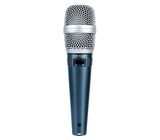This is a stage capacitor microphone, so should provide a nice detailed sound with an extended high-end compared to the majority of dynamic mics. And whilst not particularly standing out in any way, this is a decent mic with a good, almost flat, frequency response that I measured extending right up to 20kHz with almost no drop off (a lot higher than Behringer's quoted 16kHz. It does get rather bassy on a male voice when used up against the mouth, so the use of the built-in high pass filter is recommended here.
Apart from that slight bass boost, enhanced further by some proximity effect, the frequency response is almost flat, so it's not a mic with its own character, or for helping a weaker voice cut through a busy FOH mix. But it does give a very natural sound, faithful to the original voice. Sibilance wasn't an issue for me and plosive control was fairly standard for a stage mic, noticeable but not excessive.
Being a capacitor mic, it does require 48v phantom power, but as a result, gives an output that's around 10dB hotter than an SM58, which can help if the mic isn't being used from a very close distance.
Handling noise is good, and feedback resistance is roughly on a par with an SM58.
Despite the Behringer copycat naming style for their mics, it's not really a clone of a Shure Beta 87C, but a very decent mic in its own right. The smooth, flat response won't be suitable for all voices or applications, but for the quieter stile of performance, singer/songwriter gigs, backing vocals or even as a podium mic, it could be ideal. And it doesn't cost a lot so you can afford to experiment.
Probably the best of the bunch of recent Behringer issue of stage mics.


